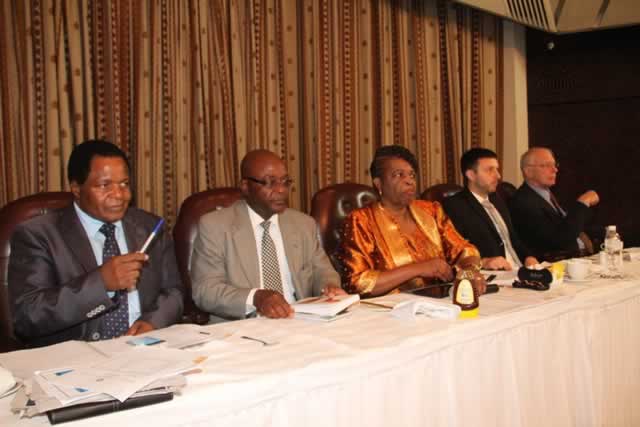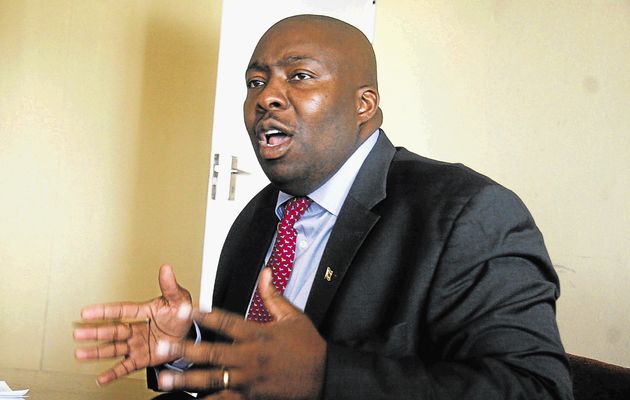‘Set up gold reserve bank’


Permanent Secretary in the Ministry of Macro-Economic Planning and Investment Promotion Dr Desire Sibanda (left) stresses a point at the investment breakfast held with the American business delegation on Friday. Looking on are (from second left) Foreign Affairs Ambassador Chitsaka Chipaziwa; Zimbabwe’s Ambassador to Canada Florence Chideya, Casey Research senior editor Nick Giambruno and Casey research chairman Doug Casey
Conrad Mwanawashe Business Reporter
VISITING investment consultants from the United States of America and Canada have implored Zimbabwe to consider setting up a gold reserve bank and introduce a gold currency with a view to attract international capital.
Under the initiatives, Zimbabwe could link the gold bank and currency to a gold debit card and finance it through economic citizenship.
Economic citizenship is when an individual goes through the process of naturalisation in a second country on account of his/her financial investment into that country’s economy.
In interactions with the business community and Government officials at a breakfast meeting on Friday, New York Times best-selling author and chairman of Casey Research, Doug Casey and Casey Research senior editor Nick Giambruno, pointed out areas where Government could target with a view of turning around the economy.
The breakfast meeting was organised by the Ministry of Macro-Economic Planning and Investment Promotion.
Apart from setting up a gold reserve bank and introducing a gold currency, they said Government could also consider the economic citizenship concept. The gold reserve bank could become an international gold bank attracting deposits from all over the world in any currency from depositors who prefer to hedge in gold. The bank would then convert the amounts deposited into gold using prevailing market rates.
They said Zimbabwe should take a leaf from developed nations such as China which, despite being the world’s largest gold producer, is heavily importing gold to back its currency.
Mr Casey, who is also an investor and international business consultant said setting up or converting the Reserve Bank of Zimbabwe into a gold bank could be necessary to raise capital.
“If you set up a gold bank in this country all the people (Zimbabweans) become shareholders and it will be possible to raise maybe as little as a $100 million on the world market and that will capitalise the bank,” said Mr Casey.
“People could deposit their euros and dollars into the gold bank and the bank will buy gold and convert the currency into gold. This is how the gold bank is built. As more and more people deposit their savings into the bank it is transferred and converted into gold and when it grows it can be converted into notes or coins and it will be growing,” he said.
He reckons that this way, there will be billions deposited into the bank by African countries and even the whole world converting their money into gold.
Apart from bringing money into the country, the use of gold as a currency could also increase confidence in Zimbabwe’s currency, financial system and ultimately economy as it attracts international capital.
“The gold bank can be implemented with technological aspects because the country can introduce gold bank debt cards and there are many ways to do this. This can make Zimbabwe a free country in Africa and the bank will create good public relations for the country,” said Mr Giambruno.
A number of countries, including China, are accumulating gold reserves because gold is fungible.
“If you did that, Zimbabwe will be the first country to have gold currency in the world and this will improve the life of Zimbabwean business people and citizens,” he said.
Local economists, however, said although the idea sounds noble, the challenge is that Zimbabwe is not aware of the quantum of minerals it possesses because there has not been enough exploration.
The director responsible for mining promotion and development in the Ministry of Mines and Mining Development, Mr Den Makandwa confirmed that opportunities are available in the exploration.
“You will realise that Zimbabwe is yet to experience extensive mineral exploration as well as application of modern technology. You will also realise that most of our minerals deposits at the moment are by global standards, except for platinum group metals, because they still need to be investigated further. This presents opportunities in exploration both in brown field and greenfield projects. We would welcome interventions in exploration,” said Mr Makandwa.
The lack of reliable information from exploration makes it difficult to use gold to back currency.
Another challenge would be the value of the gold which is determined on the world market, which may make the gold backed currency volatile.
“It is very vulnerable to speculation. In other words they (the visiting investors) are simply suggesting introduction of a local currency to improve liquidity,” said Mr Thomas Masese, an economist with the Africa University.
“It (introduction of a gold bank and gold currency) is feasible but it still needs discipline, it is the same as when you are able to seigniorage your own currency. The amount in circulation has to be correctly linked to the level of output or production in the economy. You must also have enough reserves of gold to prop up the currency when under speculative attack. You do not necessarily need a gold bank because the reserve bank through Fidelity Printers and Refiners are the legal custodians of the country’s gold,” said Mr Masese.
But the economist feels that instead of a gold bank to resuscitate or grow the economy, Zimbabwe needs to work on economy hygiene issues such as the cost of doing business, boost production, increase competitiveness of local products, attract investment, policy consistence, fighting corruption and sorting out the indigenisation issues.










Comments